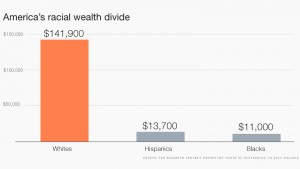(Akiit.com) Since the founding of the United States the construction of race and racial inequality has had economics at its foundation. Economic development and accumulation was the driving force behind the genocide against Indigenous peoples on this continent and the mass enslavement of African people. From these great original sins, the racializing of the economic haves and have-nots has been ongoing. Though it is hard to see during our too often toxic and deeply divided political debate, the national recognition of growing economic inequality and ongoing racial inequality is a great opportunity to take action that address both of these issues.
CFED, the Corporation for Enterprise Development, has developed a proposal requesting that the next President of the United States in her or his first 100 days take executive action that can substantively move the country forward in bridging racial economic inequality. CFED’s proposal, Presidential Action Needed to Close the Racial Wealth Divide, asks that the newly elected presid ent require a government wide-audit of all federal agencies and assess their major economic policies, programs and practices to understand how they are affecting racial economic inequality. The model for this stems from the work of Thomas Shapiro, Director of the Institute on Assets and Social Policy of Brandeis University, whose racial equity audit examines policy and quantifies its impact across various racial and ethnic groups.
ent require a government wide-audit of all federal agencies and assess their major economic policies, programs and practices to understand how they are affecting racial economic inequality. The model for this stems from the work of Thomas Shapiro, Director of the Institute on Assets and Social Policy of Brandeis University, whose racial equity audit examines policy and quantifies its impact across various racial and ethnic groups.
Too often, policy is passed with an overly broad understanding that it will help everyone but in fact maintains the racial economic inequality that currently exist. For example, many federal agencies invest billions of dollars in small businesses and hiring through procurement, but there is no accountability as to whether this investment strengthens minority businesses and advance employment in racial communities with disproportionately high unemployment. CFED’s “Presidential Action” proposal will not only require an audit that will clarify procurements positive or negative effects on racial economic inequality but will also produce a public report that will include a list of recommended best racial equity practices.
Historically, the federal government has been a leader in non-discriminatory work practices and needs to again take the lead in ensuring business practices that help bridge racial inequality. Racial economic inequality did not materialize overnight or even over the course of a few years, and overcoming this inequality will be at least a generational challenge.
Bold action by the President of the United States is an important step that can help fuel the larger change necessary to finally put racial inequality in our past. During this time of intense political debate and grand political promises, we hope that our next President will have the strength and foresight to embrace solutions that can advance the country in term of racial and economic inequality.
Written by Dedrick Muhammad
Official website; http://www.twitter.com/DedrickM









Leave a Reply